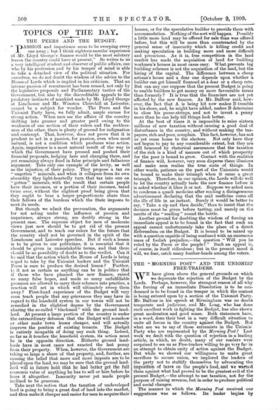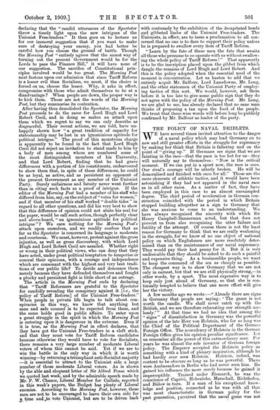THE "MORNING POST" AND THE UNIONIST FREE-TRADERS.
r have given above the general grounds on which V V we deprecate the rejection of the Budget by tho Lords. Perhaps, however, the strongest reason of all why the forcing of an immediate Dissolution is to be con- demned is to be found in the temper in which the contest is being entered upon by a section of the Unionist Party. Mr. Balfour in his speech at Birmingham was no doubt temperate and judicious, and Mr. Long, who has done such excellent work in fighting the Budget, has also shown great moderation and good sense. Both statesmen have, in a word., done their best in a very difficult situation to unite all forces in the country against the Budget. But what are we to say of those extremists in the Unionisi Party who are represented by the Morning Post? Last week we dealt with the question of rejection in a leading article, in which, no doubt, many of our readers were surprised to see us as Free-traders willint; to go wry far in an attempt to obtain unity of action against the Budget. But while we showed our willingness to make great sacrifices to secure union, we implored the leaders of the party not to stultify themselves by advocating the imposition of taxes on the people's food, and we warned, them against what had proved to be the greatest evil of the present Budget,—the attempt to use taxation, not for the purpose of raising revenue, but in order to produce political and social changes.
The manner in which the Morning Post received our suggestions was as follows. Its leader begins by 'I V? declaring that the "candid utterances of the Spectator throw a timely light upon the new intrigues of the Unionist Free-traders." It then goes on to lecture us for our immoral suggestion that if you want to make sure of destroying your enemy, you had better be careful how you choose the ground of battle. Though the Morning Post "entirely agrees that the surest way of turning out the present Government would be for the Lords to pass the Finance Bill," it will have none of our suggestion. The sacrifice of Constitutional prin- ciples involved would be too great. The Morning Post next fastens upon our admission that since Tariff Reform is a lesser evil than Socialism, we must, if the choice is forced on us, choose the lesser. Why, it asks in effect, compromise with those who admit themselves to be at a disadvantage ? When people are down, the proper way is to kick them. Those are not the words of the Morning Post, but they summarise its contention.
After having thus demolished the Spectator, the Morning Post proceeds to do the same for Lord. Hugh and. Lord Robert Cecil, and in doing so makes an attack upon them which we regret to say we can only describe as disgraceful. Their recent actions, we are told, have un- happily shown how "a great tradition of capacity for statesmanship may be lost in an ignominious aptitude for political intrigue.' The proof of this monstrous charge is apparently to be found. in the fact that Lord Hugh Cecil did not reject an invitation to stand made to him by a body of men among whom are numbered some of the most distinguished members of his University, and that Lord. Robert, finding that he had grave differences with a portion of his constituents, endeavoured to show them that, in spite of these differences, he could be as loyal, as active, and. as persistent an opponent of the present Government as any member of the Unionist Party. Surely unfairness and. fatuity never went further than in citing such facts as a proof of intrigue. If the editor of the Morning Post had a member of his staff who differed from him, say, on the subject of "votes for women," and if that member of his staff worked "double tides" in regard to all other questions, and did his very best to show that this difference of opinion could not abate his zeal for the paper, would he call such action, though perfectly clear and above-board, "an ignominious aptitude for political intrigue " ? We care nothing for the Morning Post's attack upon ourselves, and we readily confess that as far as the Spectator is concerned its language is moderate and. courteous. We must, however, protest against the gross injustice, as well as gross discourtesy, with which Lord Hugh and Lord Robert Cecil are assailed. Whether right or wrong in their political views, who can deny that they have acted, under great political temptation to temporise or conceal their opinions, with a courage and independence which are consonant with the highest and very best tradi- tions of our public life? To deride and denounce them merely because they have defended themselves and fought a plucky and persistent fight is little short of an outrage. The article in the Morning Post ends by declaring that "Tariff Reformers are grateful to the Spectator for candidly revealing the conspiracy against it [i.e. the Rey of Tariff Reform] of the Unionist Free-traders."
en people in private life begin to talk about con- spiracies in this way, we know that anything but sane and safe counsel is to be expected from them, and the same holds good in public affairs. To enter upon a great struggle in the spirit in which the Morning Post is entering upon it is dangerous in the extreme. Even if it is true, as the Morning Post in effect declares, that they have got the Unionist Free-traders in a cleft stick, sad that they must vote for Tariff Reform candidates because otherwise they would have to vote for Socialists, there remains a very large number of moderate Liberal voters of whom this cannot be said. Yet if we are to win the battle in the only way in which it is worth winning—by returning a triumphant anti-Socialist majority —it is essential to attract to the Unionist side a large number. of those moderate Liberal voters. As is shown by the able and eloquent letter of Sir Alfred Pease which we quoted last week, and. by the admirable speech made by Mr. F. W. Chance, Liberal Member for Carlisle, reported in this week's papers, the Budget has plenty of Liberal enemies. According to the Morning Post, however, these men are not to be encouraged to leave their own side for a time and„to vote Unionist, but are to be driven back with contumely by the exhibition of the decapitated heads and gibbeted limbs of the Unionist Free-traders. The Unionists, in effect, are to issue a proclamation to all con- cerned that no one is to dare to support their policy unless he is prepared to swallow every item of Tariff Reform.
"Learn by the fate of these men the fate that awaits all those who presume to co-operate with us without swallow- ing the whole policy of Tariff Reform ! " That apparently is to be the inscription placed upon the gibbet from which dangle the remains of Lord Hugh and Lord Robert. And this is the policy adopted when the essential need of the moment is concentration. Let us hasten to add that we entirely acquit Mr. Balfour, Lord Lansdowne, Mr. Long, and the other statesmen of the Unionist Party of employ- ing tactics of this sort. We would, however, ask them before it is too late to give some public sign that they do not agree with the policy of the Morning Post. Mr. Long, we are glad to see, has already declared that no sane man thinks of proposing a tax upon the food of the people. We trust that these wise words will before long be publicly confirmed by Mr. Balfour as leader of the party.



























































 Previous page
Previous page